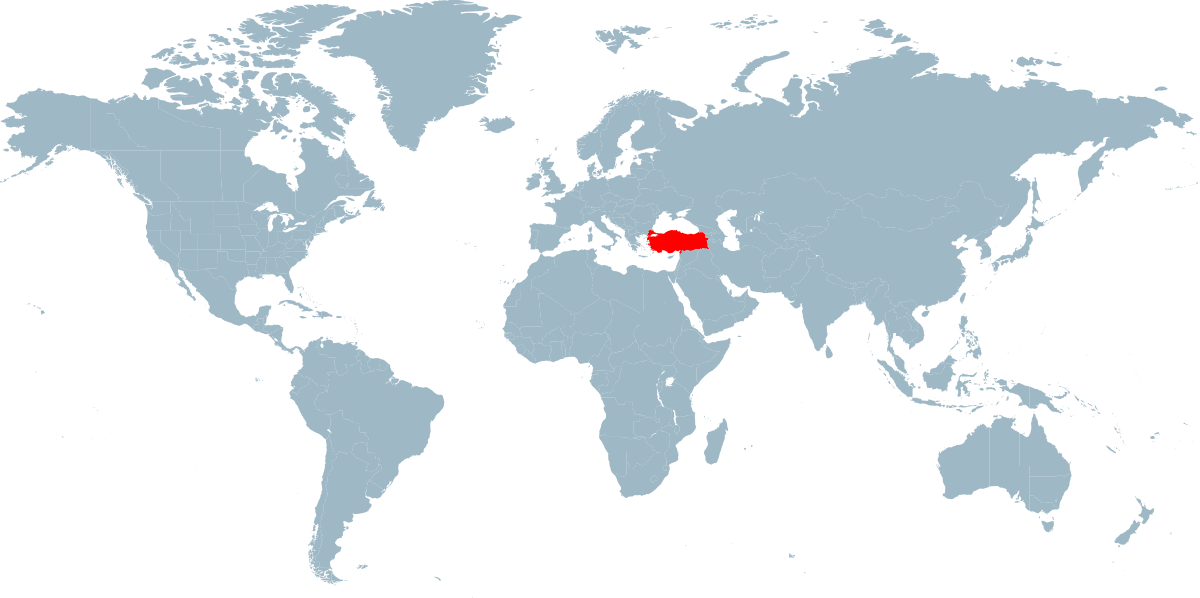Türkiye at a Glance

| Official Name of Country |
Republic of Türkiye |
| Capital City | Ankara |
| Government | Unitary presidential constitutional republic |
| Population | 85 million |
| Official Language | Turkish |
| President | Recep Tayyip Erdoğan |
| Area | 783,562.38 km² |
| Coordinates | 39° 55' North, 32° 50' East |
| Time Zone | UTC +3 |
| Neighboring Countries | Bulgaria, Greece, Syria, Iraq, Iran, Azerbaijan, Armenia, Georgia |
| Climate | Temperate; hot, dry summers with mild, wet winters |
| Telephone Code | +90 |
| Country Code Top-Level Domain | .tr |
| Electricity Voltage | 220 V, 50 Hz |
| Currency | Turkish Lira (TRY) |
| Financial Center | Istanbul |
| Traffic Flow | Free Trade Agreements with Albania, Bosnia Herzegovina, Chile, EFTA member countries (Switzerland, Norway, Iceland and Liechtenstein), Faroe Islands, Ghana, Kosovo, Lebanon, Egypt, Georgia, Israel, Jordan, Singapore, South Korea, Syria, Macedonia, Malaysia, Mauritius, Moldova, Montenegro, Morocco, Palestine, Serbia, Tunisia |
Since the founding of the Republic in 1923, Turkey has aligned itself with the West and is a member of numerous international organizations. Turkey is a founding member of the United Nations, Council of Europe, the European Bank for Reconstruction and Development and the Organization for Security and Cooperation in Europe (“OSCE”) as well as the World Bank, the IMF, the European Resettlement Fund, the Asian Development Bank, the Black Sea Economic Cooperation Organization, the Multilateral Investment Guaranty Agency (“MIGA”), the Bank for International Settlements (“BIS”) and the OECD. Turkey is also a party to the General Agreement on Tariffs and Trade (“GATT”) and a member of the World Trade Organization (“WTO”). In addition, Turkey is a member of the Organization of the Islamic Conference and of the Islamic Development Bank.
In 2018, Turkey established an executive presidential system of government after changing its long-standing parliamentary system.
Since Turkey was officially declared a candidate to the EU in the 1999 Helsinki European Council, it has been undergoing a historic period of reform and transformation. Ever since that time, necessary regulations have been completed in order to meet the Copenhagen Political Criteria. Numerous economic reform measures have also been adopted in accordance with the National Program and in response to Turkey's serious economic crises in 2001. Turkey has restructured its financial sector, ensured transparency in public finance and enhanced competitiveness and efficiency in the economy. The European Council of 17 December 2004 announced that Turkey has sufficiently fulfilled the Copenhagen political criteria and decided to open negotiations with Turkey on October 3, 2005. The screening process was completed on October 13, 2006, within only one year. As of March, 2019, negotiations were opened for 16 chapters, among them in 1 chapter negotiations were provisionally closed.
Location
Turkey, situated at the junction of Europe and Asia, is an important crossroads between Western Europe, the Middle East and Asia. Turkey's location has been a central feature of its history, culture and politics. Turkey has an area of approximately 300,000 square miles. Turkey's land borders extend for more than 1,615 miles and are shared with eight countries: Greece and Bulgaria in the west and northwest, Iran in the east, Armenia, Georgia and Azerbaijan in the northeast and Iraq and Syria in the south.
Turkey's coastline extends for approximately 4,400 miles along the Black Sea in the north, the Aegean Sea in the southwest and the Mediterranean Sea in the south, all of which are connected by the Bosphorus, the Sea of Marmara and the Dardanelles.